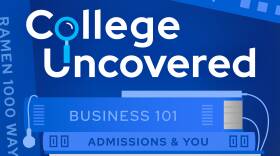Poll shows most Mass. K-12 students have used AI for schoolwork
The new statewide poll by MassINC Polling Group also shows parents are divided by the use of AI, and want more safeguards and digital literacy education.
Podcast: College Uncovered
-
[BONUS] Rethinking The Liberal Arts
Recent graduates are facing a tough job market. Young people – and even colleges – are asking fundamental, existential questions: What does it mean to be educated? And will an expensive college education help set in motion a future career? As enrollment declines, costs rise, and political pressure intensifies, some colleges and universities are rethinking the liberal arts. They’re restructuring and rebranding programs to emphasize applied humanities, weaving career preparation directly into the curriculum. In this episode of College Uncovered, GBH’s Kirk Carapezza visits Brandeis University and Clark University to learn how two liberal arts schools are responding to some of the biggest challenges the higher education industry has faced in decades. Can this model survive? Kirk also speaks with Scott Carlson, a senior writer at The Chronicle of Higher Education and author of the new book Hacking College: Why the Major Doesn’t Matter and What Really Does. Carlson argues that colleges need to “systemize serendipity.”“I think colleges and universities need to take a more deliberate role in helping students figure out this is how the college game is played and these are the various directions you can take these degrees,” Carlson says. Links:Brandeis bets big on rebuilding the liberal arts around real-world skillsClark University braces for a harsh new reality as higher ed recession loomsFrom Robin Hood to resumes: The humanities get a job market makeoverThe Revenge of the Humanities“College Uncovered” is made possible by Lumina Foundation.----------Credits:Host and Producer: Kirk Carapezza Editors: Azita Ghahramani and Lisa WardleExecutive Producer: Lee Hill Mixing and Sound Design: David Goodman & Gary MottTheme Song and original music: Left-RomanArtwork: Matt Welch Project Manager: Isabel HibbardConsulting Producer and Head of GBH Podcasts: Devin Maverick Robins"College Uncovered" is a production of GBH News -
[BONUS] 'The Worst College Football Team In The Country'
College football bowl season is underway, with wall-to-wall games on TV, packed stadiums and multi-million-dollar broadcasts dominated by a few dozen powerhouse programs.In Amherst, Massachusetts, it’s quiet. That’s because the University of Massachusetts Amherst Minutemen just finished the 2025 season without a single win, the only team in the Division I Football Bowl Subdivision to do so. Over the past 13 seasons, since joining the FBS, UMass has stumbled to a stunning 26-130 record.Their collapse has turned McGuirk Alumni Stadium into a concrete, empty symbol of a bigger problem: public universities pouring tens of millions into athletics just as American higher education is facing both a financial reckoning and a demographic enrollment cliff.“It’s a disastrous enterprise,” saidBoston Globe sports columnist Dan Shaughnessy, who has repeatedly used his weekly column to criticize UMass’s investment in football. When teams like the Minutemen can’t compete, he argues, pouring institutional dollars into football looks especially bad for a public university.“We’re sending these kids out there to take these beatings and to possibly get hurt and it’s just not right,” Shaughnessy said. “Don’t blame the athletes when you see those scores because they shouldn’t be put up against these teams.”In this episode of College Uncovered, GBH’s Kirk Carapezza talks with Amy Perko, CEO of the Knight Commission on Intercollegiate Athletics, which finds nationwide severance pay for fired football coaches has hit a record high. Public universities now owe more than $228 million in buyouts for just 15 fired head coaches.Then economist James Koch, former president of Old Dominion University and the University of Montana, explains his new statistical analysis that argues big-time college sports don’t benefit students and graduates at all and may actually leave them worse off.Links:After an abysmal season, UMass Amherst’s football program faces scrutiny“College Uncovered” is made possible by Lumina Foundation.----------Credits:Host and Producer: Kirk Carapezza Editors: Azita Ghahramani and Jenifer McKimExecutive Producer: Lee Hill Mixing and Sound Design: David Goodman & Gary MottTheme Song and original music: Left-RomanArtwork: Matt Welch Project Manager: Isabel HibbardConsulting Producer and Head of GBH Podcasts: Devin Maverick Robins"College Uncovered" is a production of GBH News -
[BONUS] OK Computer. OK College?
Artificial intelligence is still new on college campuses, but it’s already transforming how professors teach and how students learn. Surveys show most students now rely on generative AI for everything from applying to college to getting through it. Some educators are leaning in, treating AI as a teaching partner. Others are leaning out, doubling down on in-person, discussion-based learning. Either way, one thing is clear: AI isn’t going anywhere.This new technology is also reshaping the job market. Young workers are seeing fewer openings in fields most exposed to automation — software development, social media, coding. That’s why colleges are racing to future-proof their programs.In this bonus episode of College Uncovered, GBH’s Kirk Carapezza visits campuses to hear directly from professors and students who are adapting in real time. Harvard physicist Greg Kestin has built a custom chatbot — an “always-on” tutor that mimics himself. Boston College English professor Carlo Rotella, author of What Can I Get Out of This?, sees his unplugged, device-free classes as cutting-edge, urging students to slow down and do the work of building something together themselves. At Wentworth Institute of Technology, faculty are designing a new applied AI degree to give graduates a kind of surfboard to ride the coming digital and labor tsunamis. And Kerry McKittrick, co-director of Harvard’s Project on Workforce, explains what students and families need to know right now about AI and college and how colleges are using AI to boost completion rates and align what they teach with what employers actually need.Additional links: With AI common on campus, some educators are leaning in (GBH)Rather than AI, this professor chooses a chalkboard and old-fashioned books (GBH)Colleges hope to ‘AI-proof’ their offerings as new tech changes job expectations (GBH)Crossing the Great AI Divide (Georgetown University Center on Education and the Workforce)“College Uncovered” is made possible by Lumina Foundation.----------Credits:Host and Producer: Kirk Carapezza Editors: Azita Ghahramani and Jenifer McKimExecutive Producer: Lee Hill Mixing and Sound Design: David Goodman & Gary MottTheme Song and original music: Left-RomanArtwork: Matt Welch Project Manager: Isabel HibbardConsulting Producer and Head of GBH Podcasts: Devin Maverick Robins"College Uncovered" is a production of GBH News -
[BONUS] The New College Compact
Across the country, public universities are being flooded with requests for syllabi, reading lists, course materials, and data on international students. One company is behind many of those requests - Metric Media. Part of a growing network of conservative-led groups, Metric Media says it’s enforcing civil rights laws and holding taxpayer-funded institutions accountable. But critics see something very different: a coordinated pressure campaign emboldened by the second Trump administration that threatens academic freedom and seeks to intimidate scholars. Now some universities are pushing back.In this bonus episode of College Uncovered, GBH’s Kirk Carapezza talks with Brian Timpone, CEO and founder of Metric Media. In a rare interview, Timpone says there’s great public interest in what public universities are teaching students and he thinks America’s public colleges have lost sight of their mission.“Some of the names of these courses, they’re almost like The Onion,” Timpone says.Dan Kennedy, a Northeastern University journalism professor, argues that groups like Metric Media are weaponizing public records laws to pressure and silence professors. We also hear from two faculty members who’ve been targeted: Christopher Petsko, a business professor at the University of North Carolina, and Jennifer Ho, a professor of Ethnic Studies at the University of Colorado–Boulder.And as the Trump administration threatens to withhold federal research funding unless universities sign its proposed “Compact for Academic Excellence in Higher Education,” some schools have already declined.Ted Mitchell, president of the American Council on Education, tells us why he believes the compact would be disastrous for colleges and the country and why you should care.“This is nothing short of a government attempt to make institutions creatures of the state,” Mitchell said. “That’s so antithetical to what higher education is and does. Higher education is about inquiry-based research, discovery-based teaching, and to deprive institutions of the ability to do that is really tantamount to just making them propaganda engines.”The New College Compact explores the escalating battle over academic freedom, political pressure, and the future of higher education in America.Additional links: Local colleges targeted amid growing campus culture warsZombies, Garbage And Vampires? It's Not A Nightmare, It's Your College Course CatalogUn-Welcome to CollegeDEI Backlash“College Uncovered” is made possible by Lumina Foundation.----------Credits:Host and Producer: Kirk Carapezza Editors: Azita Ghahramani and Jenifer McKimExecutive Producer: Lee Hill Mixing and Sound Design: David Goodman & Gary MottTheme Song and original music: Left-RomanArtwork: Matt Welch Project Manager: Meiqian HeConsulting Producer and Head of GBH Podcasts: Devin Maverick Robins"College Uncovered" is a production of GBH News -
Science In Reverse
The government rescinded billions in federal research grants during Trump’s first few months in office — cutting fellowships, scholarships, and postdoc programs that support the next generation of scientists.A federal judge recently ordered the restoration of some National Institutes of Health grants. A battle over National Science Foundation funding is still playing out in court.So what do these cuts actually mean for higher education and scientific discovery? And if the United States gives up its global lead in innovation and research, what does that mean for the rest of us?In this episode of College Uncovered, host Kirk Carapezza and reporter Craig LeMoult visit one public university hit especially hard — and explore what’s really at stake for American science.“College Uncovered” is made possible by Lumina Foundation.----------Credits:Host and Producer: Kirk Carapezza Editor: Jenifer McKimExecutive Producer: Lee Hill Mixing and Sound Design: David Goodman & Gary MottTheme Song and original music: Left-RomanArtwork: Matt Welch Project Manager: Meiqian HeConsulting Producer and Head of GBH Podcasts: Devin Maverick Robins"College Uncovered" is a production of GBH News and The Hechinger Report.













